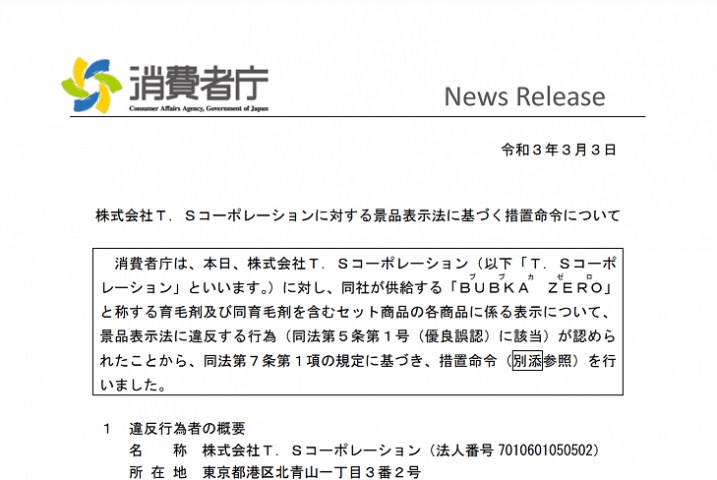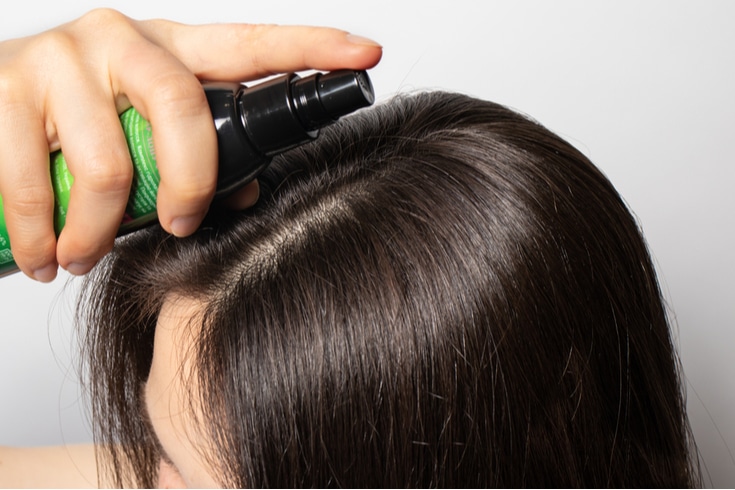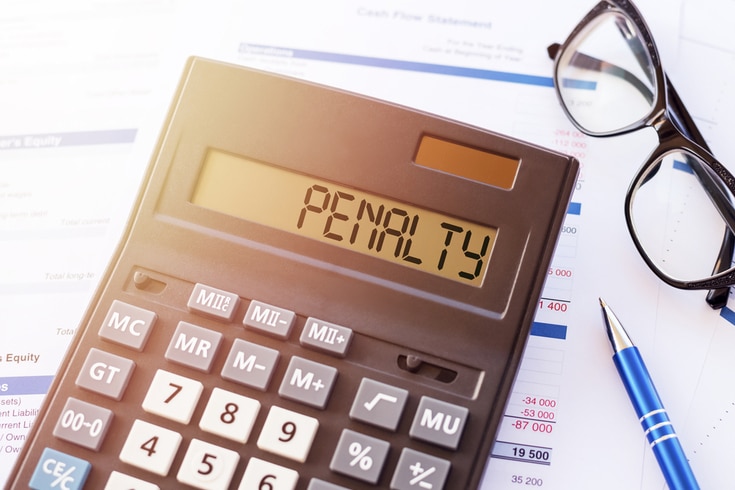What are the Risks of Selling Products without Evidence of Effectiveness? An Explanation of the Japanese 'Act against Unjustifiable Premiums and Misleading Representations' Based on a Case Study of Hair Growth Products

In September 2021, the Japanese Consumer Affairs Agency imposed a fine of 17.47 million yen on T.S Corporation, the company selling a hair growth product called “BUBKA ZERO”. This was due to the company’s violation of the Japanese Act against Unjustifiable Premiums and Misleading Representations (Act on Prohibition of Private Monopolization and Maintenance of Fair Trade).
In this article, we will discuss the risks associated with marketing and selling products that claim to have effects without any rational basis, using the case of “BUBKA ZERO” as an example.
The Sequence of Events Regarding “BUBKA ZERO”
“BUBKA ZERO,” a hair growth product, was marketed with claims of quick results. However, the Consumer Affairs Agency (CAA) determined that there was no rational basis for these effects and issued orders for corrective measures and payment of surcharges.
Overview of the Problematic Claims
Despite the lack of a rational basis, the product was advertised on affiliate sites as producing quick results, which was deemed to be a misleading representation under the Act against Unfair Premiums and Misleading Representations (Japanese Act against Unfair Premiums and Misleading Representations). Specifically, the following claims were problematic:
“A hair growth product that 90% of people found effective, proven by mouse experiments at a famous university and recommended by medical professionals, is alarming!” Along with images of a thin-haired scalp and a thick-haired scalp connected by an arrow, “It’s like a lie that I was worried about, but my hair became thick in just two months!!! Now my hair grows so much that I can’t see my scalp anymore, and when I go to the barber, they say, ‘You have a lot of hair~’ (laughs). I used to hate losing hair, but now I can wash my hair vigorously, and it feels like I’m back in my 20s.”

Although these claims were accompanied by phrases such as “※This is an image” and “※This is a personal opinion,” it was determined that “these claims do not negate the perception of the product’s effects that general consumers receive from the above claims.”
Corrective Measures Order
In March 2021, the CAA issued the following corrective measures order to T.S Corporation, the company selling “BUBKA ZERO”:
- Ensure that general consumers are fully aware that the claims are significantly superior to the actual product and violate the Act against Unfair Premiums and Misleading Representations
- Take measures to prevent recurrence and ensure that these measures are fully understood by the officers
- Do not make claims similar to those that were found to be in violation this time without having a rational basis to support the claims in advance
Order for Payment of Surcharges
In September 2021, T.S Corporation was ordered to pay a surcharge of 17.47 million yen. The Act against Unfair Premiums and Misleading Representations, Article 8, Paragraph 1 provides for an exemption from the order for payment of surcharges. The conditions for this exemption are “when it is recognized that the business operator did not know that the claims related to the surcharge-related act were misleading or advantageous misrepresentations throughout the period of the surcharge-related act, and did not neglect due care not to know, or when the amount is less than 1.5 million yen.” However, it was determined that “T.S Corporation conducted the surcharge-related act without sufficiently verifying the supporting documents for the claims,” and therefore did not meet the conditions for this exemption.

What is the Japanese Premiums and Representations Act?
The Japanese Premiums and Representations Act is a law that was established with the purpose of:
“Preventing customer inducement by unfair premiums and representations related to the transactions of goods and services, and protecting the interests of general consumers by regulating and prohibiting acts that may hinder voluntary and rational choices by general consumers.”
Article 1 of the Japanese Premiums and Representations Act
This law ensures that general consumers do not suffer disadvantages, such as purchasing ineffective products, due to unfair premiums and advertisements. It stipulates the prohibition and regulation of unfair representations and premiums.
For more information on the double pricing representation under the Japanese Premiums and Representations Act, please refer to the following article.
https://monolith.law/corporate/display-double-law-point[ja]
Types of Unfair Representations
Under the Japanese Premiums and Representations Act, the following are defined as unfair representations:
- Superiority Misrepresentation
- Advantage Misrepresentation
- Other representations that may cause consumers to misunderstand
Among these, as in the case of “BUBKA ZERO” mentioned above, selling a product by representing it as effective without any basis is considered a “Superiority Misrepresentation”.
Superiority Misrepresentation refers to “unfair representation about the quality, standards, and other contents of goods/services”, which includes:
- Representations that make it appear significantly superior to the actual product
- Representations that make it appear significantly superior to competitors’ products, even though it is not
Specifically, the following are examples of Superiority Misrepresentation:
- Representing “Just apply and your spots will disappear!” without any rational basis
- Representing “Only our product uses this part” despite the fact that competing businesses also use the same part
These are considered Superiority Misrepresentations.

Penalties for Superiority Misrepresentation
If the representation is deemed to be a Superiority Misrepresentation and is found to be in violation of the Japanese Premiums and Representations Act, the following measures will be ordered:
- Thoroughly informing general consumers that the representation is a Superiority Misrepresentation
- Taking measures to prevent recurrence
- Not committing the same violation in the future
If these orders are violated, a penalty of imprisonment for up to 2 years or a fine of up to 3 million yen will be imposed. In addition, not only can a fine of up to 300 million yen be imposed on corporate entities, but a fine of up to 3 million yen can also be imposed on the representatives of the corporation.
In addition, an order to pay a surcharge will be issued. The amount of the surcharge is calculated by multiplying 3% of the sales amount of the goods/services with unfair representation during the surcharge target period (up to 3 years). This sales amount is calculated by summing the consideration for the goods and services sold during the surcharge target period with unfair representation, in principle.
The order to pay a surcharge will not be issued in the following cases:
- When it is recognized that the person who committed the surcharge target act did not know that the representation was significantly superior or advantageous throughout the period of the act, and did not neglect due care not to know
- When the calculated amount is less than 1.5 million yen
- When the surcharge amount becomes less than 10,000 yen after implementing a refund measure and reducing the amount
The Consumer Affairs Agency can request the submission of documents that provide a rational basis for the representation if there is a suspicion of Superiority Misrepresentation. However, if no documents are submitted or if the documents are not recognized as providing a rational basis, the representation will be considered a Superiority Misrepresentation in relation to the order, and will be presumed to be a Superiority Misrepresentation in relation to the surcharge payment order, and will be subject to the order and surcharge payment order.
Summary
In advertising, there may be a temptation to use exaggerated expressions to sell products. However, selling products by claiming effects without a rational basis is a violation of the Japanese Act against Unjustifiable Premiums and Misleading Representations. If you violate this Act, you may receive orders for measures or payment of surcharges from the Consumer Affairs Agency. This not only damages the credibility of your company but also results in economic losses.
It may be difficult to determine what kind of representation constitutes an unfair representation. To avoid unintentionally violating the law, it is safe to consult with a lawyer who is familiar with advertising laws when creating advertisements.
In this article, we have explained the misleading representation of excellence under the Japanese Act against Unjustifiable Premiums and Misleading Representations. Depending on the type of product, you may also be subject to regulations under other laws. For examples of exaggerated advertising and penalties, please refer to the following article.
https://monolith.law/corporate/hype-penalties[ja]
Introduction to Our Firm’s Measures
Monolith Law Office is a legal office with high expertise in both IT, particularly the Internet, and law. In recent years, violations of the Japanese Premiums and Representations Act, such as misleading superior claims in online advertising, have become a significant issue, and the need for legal checks is increasingly growing. Our firm analyzes the legal risks associated with businesses that have already started or are about to start, based on various legal regulations, and aims to legalize them as much as possible without stopping the business. Details are described in the article below.
Category: General Corporate





















